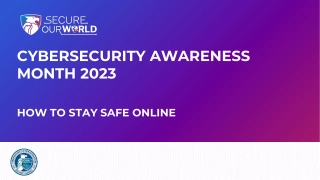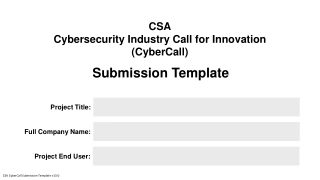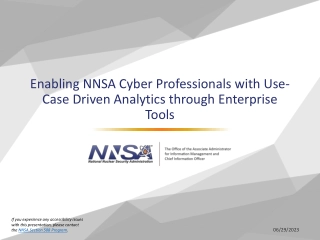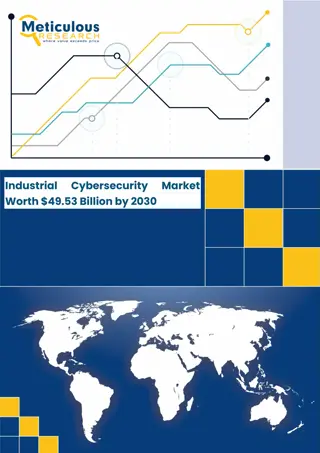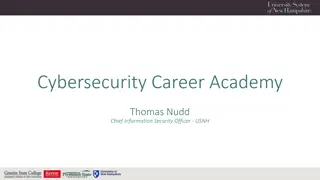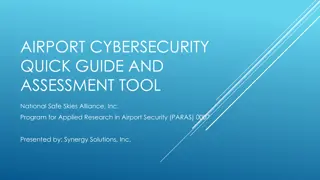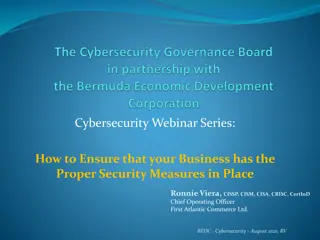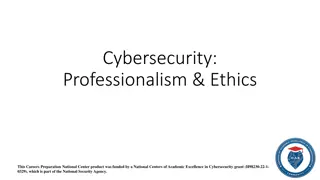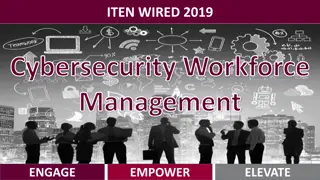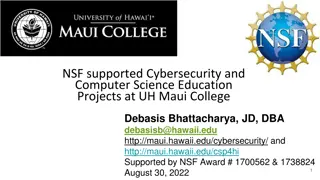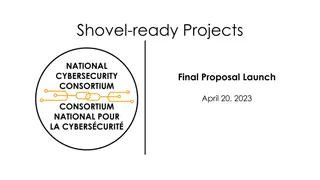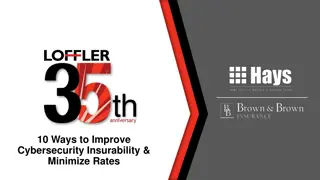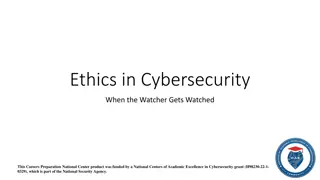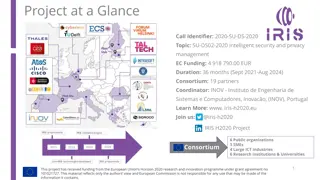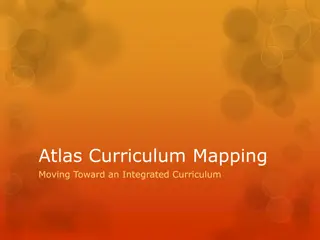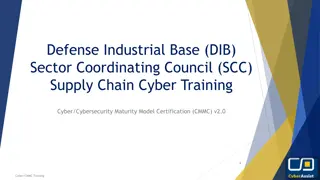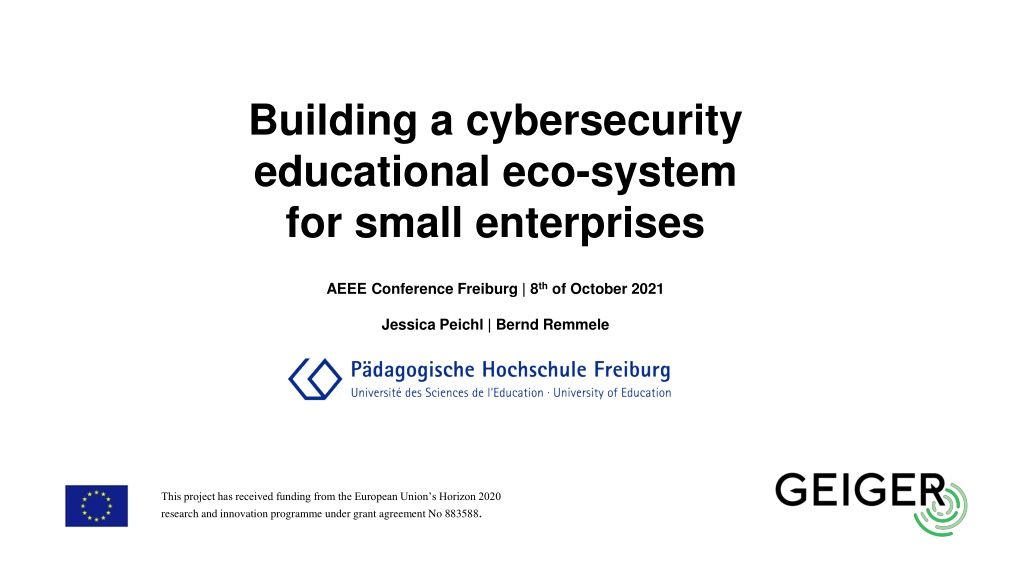
Enhancing Cybersecurity Education for Small Enterprises
Establishing a cybersecurity educational eco-system aimed at small enterprises in Europe, addressing the lack of protection against cyber attacks. Statistics reveal the vulnerability of Micro and Small Enterprises (MSEs) to breaches and the urgent need for enhanced cybersecurity measures. The increasing digitization within MSEs poses significant risks, necessitating attention to both technological and human factors. Entrepreneurship education must evolve to integrate cybersecurity as a vital component of business viability and management, considering the impact of human behavior on cyber-attack vulnerabilities. The GEIGER Horizon 2020 EU-funded project is designed to aid European small businesses in tackling their cybersecurity challenges effectively.
Download Presentation

Please find below an Image/Link to download the presentation.
The content on the website is provided AS IS for your information and personal use only. It may not be sold, licensed, or shared on other websites without obtaining consent from the author. If you encounter any issues during the download, it is possible that the publisher has removed the file from their server.
You are allowed to download the files provided on this website for personal or commercial use, subject to the condition that they are used lawfully. All files are the property of their respective owners.
The content on the website is provided AS IS for your information and personal use only. It may not be sold, licensed, or shared on other websites without obtaining consent from the author.
E N D
Presentation Transcript
Building a cybersecurity educational eco-system for small enterprises AEEE Conference Freiburg | 8th of October 2021 Jessica Peichl | Bernd Remmele This project has received funding from the European Union s Horizon 2020 research and innovation programme under grant agreement No 883588.
Who has already experienced or knows someone who has experienced a cyber attack in personal context? in business context? Who is not afraid of cyber attacks?
Cybersecurity in Europes MSEs Micro and Small Enterprises (MSEs) represent 98.9% of the European enterprises. They are not sufficiently protected against negligent behaviour and malicious attacks. 60% of small businesses experienced a breach or attack 1 43% of cyber attacks target small businesses 2 More than 77% of organizations do not have a Cyber Security Incident Response plan 2 60% of MSEs go out of business within six months after a severe cyber attack3 1 https://assets.kpmg/content/dam/kpmg/pdf/2016/02/small-business-reputation-new.pdf 2https://www.cybintsolutions.com/cyber-security-facts-stats/ 3https://cybersecurityventures.com/60-percent-of-small-companies-close-within-6-months-of-being-hacked/
Cybersecurity in Europes MSEs Increasing digitisation within MSEs leads to growing risks in cybersecurity: Technological aspects: security state of IT-components The human factor : behaviour and knowledge of staff
Cyber-attacks often benefit from human behaviour as the weakest link in the IT-security! Particularly if there is no dedicated IT department like in most small enterprises https://www.enisa.europa.eu/topics/threat-risk-management/threats-and-trends/etl-review-folder/etl-2020-main-incidents
Consequences for Entrepreneurship Education If planning and managing e.g. the financial viability of a business is part of entrepreneurial competences, shouldn t nowadays the digital viability be part as well? This does not only imply one s own knowledge/behaviour as entrepreneur but also that of staff. Thus human resource management needs to include cybersecurity as well.
GEIGER Horizon 2020 EU-funded Project Goal of helping small businesses within Europe face their cybersecurity challenges Integration of a technological approach with an educational eco-system aimed at MSEs
human factor approach: GEIGER educational eco-system MSE-specific target groups: From IT-lay persons to designated persons that will ensure cybersecurity within their own or other MSEs Learning scenarios: Self-regulated learning within the GEIGER App Courses offered by Education Providers, e.g. MSE associations
Curriculum: dimensions Topical pillars Object layers Levels of competence Cybersecurity awareness, incl. cyber-secure behavior Knowledge about GEIGER Interaction with other users of GEIGER Level 0 - Basic Cybersecurity Level 1 - General MSE- Related Cybersecurity Level 2 - Advanced MSE-Related Cybersecurity Level 3 - MSE-Related Cybersecurity Proficiency Level 4 IT Specialist Phishing Identity Theft Malware DDoS Ransomware Web-based Attacks Physical Manipulation . GDPR
Competence levels Competence level Objective Learning environment Level 0 - Basic Cybersecure Behaviour Everyday issues of cyber-security everyday incidental learning situated learning in business-context: - Self-regulated learning - Course based learning Level 1 - General MSE-Related Cybersecure Behaviour General set of business-related cyber-security issues, relevant for IT-lay employees Level 2 - Advanced MSE-Related Cybersecure Behaviour Broad set of MSE-specific cyber-security issues, relevant for IT-lay employees of MSEs organised instruction: - course-based learning Advanced and coherent set of MSE-specific cyber- security issues, relevant for the person monitoring the IT-ecosystem of an MSE Level 3 - MSE-Related Cybersecurity Proficiency expert-lead instruction: - course-based learning expert-lead instruction: course-based learning Level 4 IT Specialist Handling of GEIGER within an MSE
Cybersecurity education topics threat landscape Based on recommendations of European Union Agency for Cybersecurity (ENISA) All ENISA threats: MSE employee perspective Adaption for non-IT MSE employee perspective
From competence grid and threat landscape to curriculum Level 1 / 2 email/communication based threats - phishing, spam, identity theft Malware Level 3 Identity theft Competence level Objective Learning environment Used two-factor/multi-factor authentication Installed Anti-malware application Everyday issues of cyber-security, mainly relate to internet-based communication and the usage of passwords General set of business-related cyber- security issues, relevant for IT-lay employees Broad set of MSE-specific cyber-security issues, relevant for IT-lay employees of MSEs. Advanced and coherent set of MSE- specific cyber-security issues, relevant for the person monitoring the IT- ecosystem of an MSE Handling of GEIGER within an MSE Level 0 - Basic Cybersecure Behaviour acquirable through everyday incidental learning Level 1 - IT-lay MSE employee Installed, Configured Adblocker and Javascript blocker (for malware prevention) Created a long and complex password the importance of using unique passwords for applications and services Experienced Created data backup (for malware mitigation) Level 1 - General MSE- Related Cybersecure Behaviour Level 2 - Advanced MSE- Related Cybersecure Behaviour acquirable through situated learning in business-context Configured password breach monitor Configured automated updates Configured an anti-malware application accepted user privileges (for malware prevention) experienced /read (or similar) experienced /read (or similar) experienced /read (or similar) Selected suspicious links in e-mails basic actions after an malware attack acquirable through organised instruction, e.g. through in-house training reasons for regular security updates (for malware prevention) Selected suspicious download attachments basic rules for secure browsing (for malware prevention) Selected fake domains, e.g. fake banking websites acquirable through expert-lead instruction, i.e. specialized cybersecurity courses Level 3 - MSE-Related Cybersecurity Proficiency Installed a spam filter read antivirus software monitoring results the importance of double-checking bank recipient informations through a different medium potential misuse cases of detailed personal information (e.g. published on social media) updates of standard software, operating systems and drivers Experienced Experienced Level 4 IT Specialist specialized GEIGER courses Installed Installed, Configured Spam filter (on the client side) (for malware prevention) Used a password manager Used e-mail encryption and digital signatures read BYOD rules (for malware prevention) software update plan (for malware prevention) Configured a spam filter viewed automatic execution of code, macros, rendering of graphics or preloading links for standard software applications (lay or some experience) Level 2 - MSE employee remote work security practices (for malware prevention) Disabled acknowled read / experienced options of keeping up to date about new threats Configured password breach monitor experienced /read (or similar) cyberrisk insurance policies, including damages a cyber insurance policy should cover Hardware, firmware, operating system and any drivers or software updated standard operating procedures and policies for handling sensitive data SSO authentication methods (for identity theft prevention) Created used selected Anti-malware application Created allowlists used data loss prevention solutions (DLP) created user privileges (for malware prevention) Level 3 - (Certified) Security Defender secure e-mail gateway with regular and automated maintenance of filters on the client side strong cloud security operations and simultaneous backups (for identity theft prevention) configured ensured defined basic actions after an malware attack SOF, DMARC and DKIM standards for reducing spam e-mails use of encryption methods such as TLS on the MSE website execution in the temp folder (for malware prevention) experienced ensured Configured How to Hardware, firmware, operating system and any drivers or software updated defined BYOD rules a software update plan (for malware prevention) configured malicous URL detector created isolated infected devices (for malware mitigation) defined remote work security practices unsupported products (for malware prevention) replaced
to be continued! Cybersecurity as a relevant skill for managers and staff Educational approach and adapted for MSE-specific needs in terms of levels and content (current threats) Cybersecurity as a future competence in Entrepreneurship Education?
www.cyber-geiger.eu This project has received funding from the European Union s Horizon 2020 research and innovation programme under grant agreement No 883588.

